#board games\
Explore tagged Tumblr posts
Text

11K notes
·
View notes
Text

More of my artwork from Nature by NorthStar Games. This is the Flight module's Faraway Place, a tropical island paradise for birds to migrate to that can't be reached by predators or competitors. Based on a photo I took at a real world location that's very close to my heart - does anyone recognize specifically which island this is?
#birblr#birds#scientific illustration#board games#saipan#artists on tumblr#tropicbird#tern#noddy#tropical island
3K notes
·
View notes
Text
Self promo for my newest card game, Jewel Thief; but you can play it for free! First, though, let's cover the basics...
TL;DR - Its a 4+ player competetive card-matching game with four rule variants; buy it here or look for the orange text in this post to learn how to play it with a regular deck
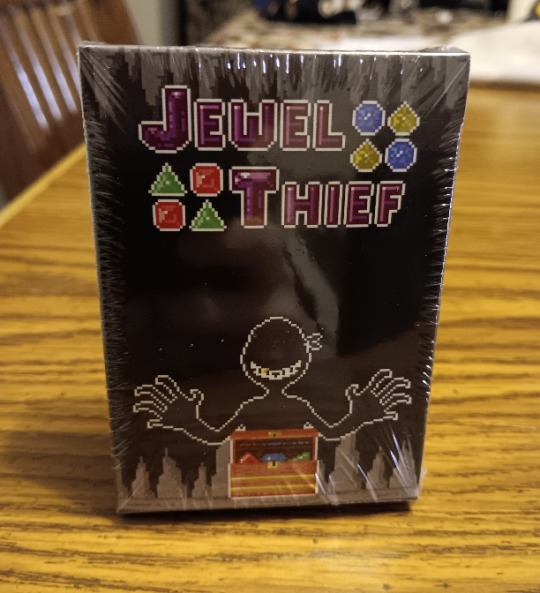
"What is Jewel Thief?"
It's a card matching game with a villain; one player tries to match jewels in a 36 card grid while their opponent, the titular Jewel Thief, periodically steals cards from the board. You can check out its page on The Game Crafter for more information, but it'll spoil the rest of this post
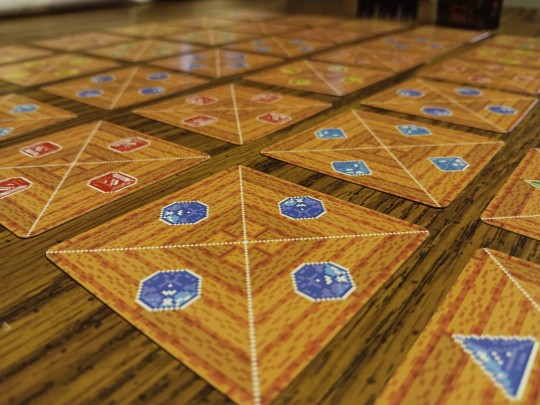
"What makes it special?"
The game's turn structure would theorettically allow you, perhaps via some kind of infinite cloning machine, to play a round of Jewel Thief til the heat death of the universe. While I wouldnt recommend that, its lack of a player cap (and ease of set-up; seriously, all you do is put cards on a table) makes it a good party game choice.
But that's not all!
There are three extra rule variants that drastically alter the gameplay while keeping card matching and stealing as main mechanics. I believe the cards are versatile enough to allow for many custom games, too
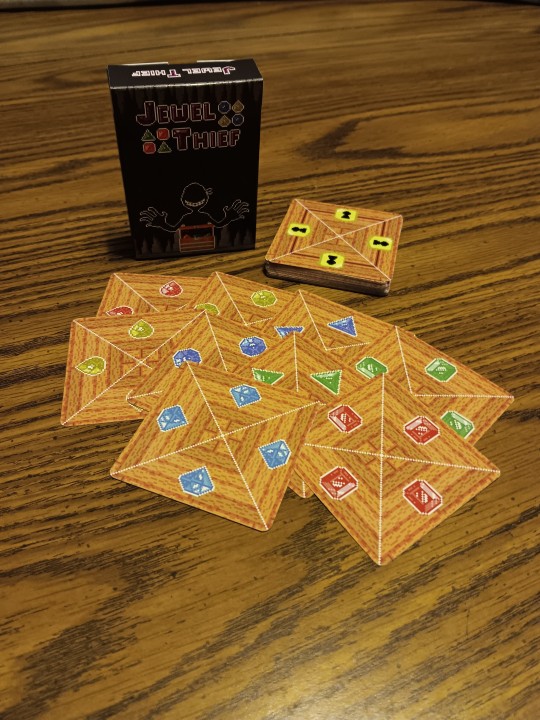
"Okay, but why should I buy a silly game from some bug nerd?"
First off, ouch. Second off, that's the best part; you dont have to buy it to play it! Jewel Thief can be played with a standard 52 card deck. Here's how:
Step 1. Remove the 10s, Jacks, Queens, Kings and Jokers
Step 2. Download the free rules from the shop page
Step 3. Play the game, matching cards based on their values. You'll need to designate a value as the Diamond jewel for game 4
-------
That's it for my little self-promo. If you dont buy the game, I hope you'll at least give it a try and consider supporting my future projects.
I also post art and photography, which you can find under the bugbeast art and bugbeast photos tags. I hope you check them out
Thank you for your time <3
--------
Edit (Mar. 25, 2024) : Thank you to everyone who liked and reblogged this; if you play the game I encourage you to share your thoughts in the comments and/or reblogs (even if you hated it). Feel free to share any custom games or house rules you come up with, too. I'd love to try them!
Edit (Aug. 10, 2024) : Final edit most likely; gonna blaze this one more time for good luck then maybe start work on a postmortem for the project, maybe give a little backstory for anyone who cares. Life is a little rough right now, but fate willing, I'll be able to work on/post about my future projects, including the future of Jewel Thief itself
#bugbeast games#indie artist#independent artist#indie games#indiegameart#tabletop games#indie designer#card games#board games#party games#self promo#pixel art#pixel aesthetic#jewel thief#artists on tumblr#board game design#card game design#card matching#card game art#card game development#board game art#independent games
3K notes
·
View notes
Text
To be completely fair to the Dungeons & Dragons fandom, groups actively making themselves miserable by adopting house rules that emphasise aspects of play they dislike, then blaming it on the game isn't something that's specific to Dungeons & Dragons, nor even to tabletop RPGs. Think of all the casual board-gaming groups who play Monopoly with a bunch of house rules that are practically calculated to make the game take three times as long to finish (e.g., removing property auctions, cash on Free Parking, etc.), then constantly complain that it takes forever to play.
#gaming#tabletop roleplaying#tabletop rpgs#tabletop games#board games#dungeons & dragons#d&d#monopoly#game design#house rules#swearing
1K notes
·
View notes
Text
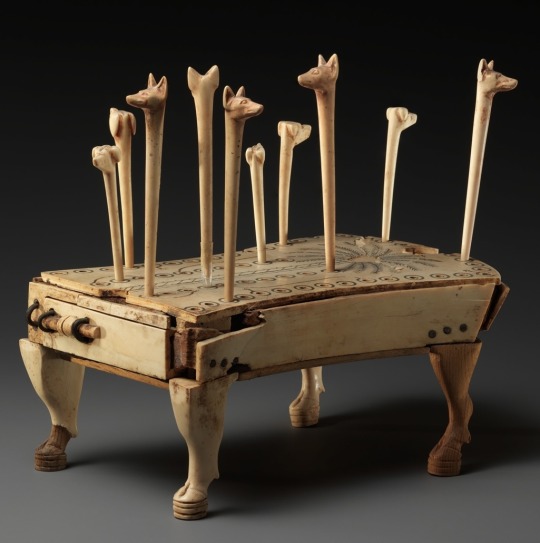
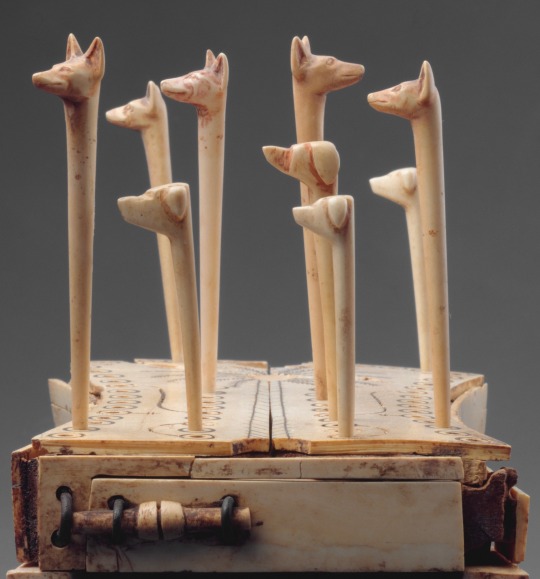
Egyptian
Game of Hounds and Jackals
Middle Kingdom, ca. 1814-1805 B.C.E.
#egyptian art#ancient egypt#ancient art#hounds and jackals#ancient history#artifact#antiquities#ancient people#ancient culture#egyptian history#egyptian culture#board games#chess#aesthetic#beauty#art history#aesthetictumblr#tumblraesthetic#tumblrpic#tumblrpictures#tumblr art#tumblrstyle#artists on tumblr#ancient artifacts
5K notes
·
View notes
Text

608 notes
·
View notes
Text




An evening wasted with friends is an evening wasted well.
Read more Tiff & Eve on Webtoon! Check out the Patreon.
#tiff and eve#arkham horror#comic strip#original art#webcomic#my art#illustration#newspaper comics#board games#ttrpg#trans character#nostalgic
791 notes
·
View notes
Text


🛡️Today really is full of surprises, isn't it? We heard your calls once again.. and!!
🔮New ROTEMNTEE alien - Wizard and Artificer mini prints are available for purchase!
🛡️These add ons are available for pledges starting from the $65 Standard Edition Tier!! Please refrain from sharing image! Keep checking back here for all our updates!
Hoot n' hollering! Let's get this going!
#dnd#dungeons and dragons#table top games#table top#mini figurines#figurines#dnd minatures#minatures#rpg#ttrpg#fantasy#character design#role play#immersive#science fantasy#cosmic#combat#board games#table top gaming#game night#dnd character#lost company#dark elves#orcs#warrior#dwarves#rottmnt#big mama#rise of the teenage mutant ninja turtles#tmnt
585 notes
·
View notes
Text
I bet game night between the Bats and Supers goes so hard. A family of detectives and a family of investigative journalists, all with a natural competitive drive, whose side hobbling of superhero-ing literally involves beating the crap out of people? You get your ass that it turns into full out war.
The bats always win at charades. Dick and Bruce are the highest scorers—they know each other too well, Bruce can just tilt his head a certain way and Dick will instantly know what he means, it’s creepy as shit. They also regularly win at monopoly (all those hours Tim’s spent at WE and DI come in handy) and trivial pursuit (Jason’s a nerd, he would kick Bruce’s ass at that game at age 12 and that hasn’t changed—if anything he’s gotten better.) Steph is the reigning champion in Apples to Apples.
But the supers are naturally good at Jenga and pretty much any card game. Clark’s also an ace at scrabble, strangely enough, mahjong (thought Bruce gives him a run for his money, he played a lot with Ra’s al Guhl). Kon has been leading in Uno for years, but Tim insists he’s cheating.
The only game they don’t play is Clue. It got so combative and chaotic that Alfred had to call in Lois to help him keep World War 3 from breaking out in Wayne Manor.
#dc#dc comics#bruce wayne#batman#batfamily#dick grayson#batfamily headcannons#tim drake#jason todd#justice league#Clark Kent#jon kent#damian wayne#conner kent#kon el superboy#superfamily#superman#red robin#Robin#red hood#superboy#board games#batfamily game night#batdad#batman family#Cassandra Cain#Stephanie brown
517 notes
·
View notes
Text
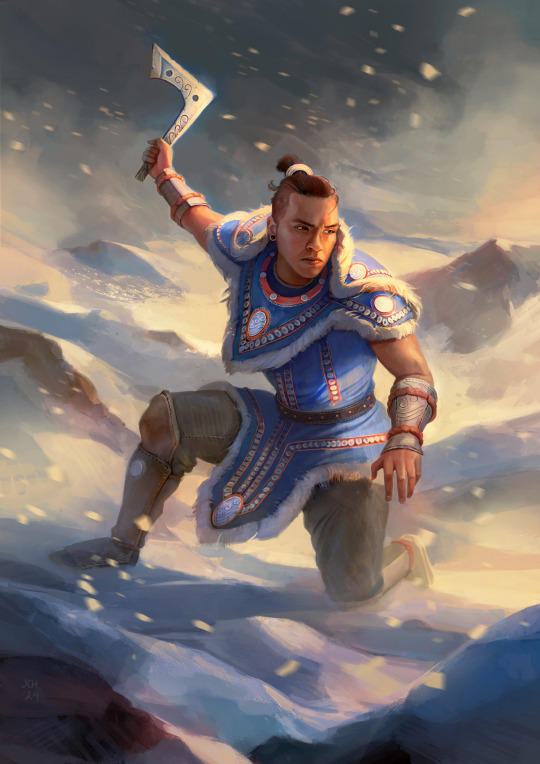
In celebration of the upcoming Avatar series I made three illustrations depicting key characters. Here is Sokka, the boomerang wielding warrior from the Southern Water Tribe.
Please let me know what you think and if you are going to watch the show!
All the best,
Joel
#dungeons and dragons#board games#concept art#fantasy art#tabletop games#magic the gathering#digital painting#character design#ancient history#armor#avatar art#avatar fandom#avatar fanart#sokka#katara#aang#zuko#azula#iroh
2K notes
·
View notes
Text


who tf is bella playing twister with? 😭
#i saw twilight on the big screen tonight and this is something i haven’t noticed before#does edward play it at night?#does she take it to family game night?#i need answers#twilight#twister#board games#bella swan#edward cullen#twilight renaissance#twilight saga#breaking dawn#eclipse#jasper hale#jacob black#renesmee cullen#esme cullen#carlisle cullen#rosalie hale#new moon#alice cullen#emmett cullen
547 notes
·
View notes
Text

Amber & Avery
Commission for @patricia-taxxon! Thank you so much! Reading up on board game rules…
646 notes
·
View notes
Video
tumblr
Capitalism: the board game you were born into, can never stop playing, and can never win!
3K notes
·
View notes
Text


OMG, they made a game for me! I'll never forget when I was at the branch and a patron asked the library assistant at the front desk if she could speak to the supervisor b/c I was too loud. The assistant said, "That IS the supervisor."
It's real- Walmart and Amazon have it.
241 notes
·
View notes
Text
I'm spinning this off of the main thread about tracing the origin of the term "d66" because it's not strictly germane to the topic – none of these examples actually use the term "d66" to describe their dice-rolling methods – but I'm going to post it anyway as a matter of general interest: following a conversation with Tumblr user @notclevr, it appears that before tabletop wargames (and, nearly concurrently, tabletop RPGs) got their hands on the mechanic, the principal (though by no means exclusive) users of the old "roll a six-sided die twice, reading one die as the 'tens' place and the other die as the 'ones' place" trick may have been tabletop American baseball simulators.
The most notable example of the type – and the only well-known example still in publication today – is J Richard Seitz' APBA Baseball, first published in either 1950 or 1951 (accounts vary). In this game, a d66 roll is cross-referenced with a card representing the active player and a "board" representing the current situation on the field:
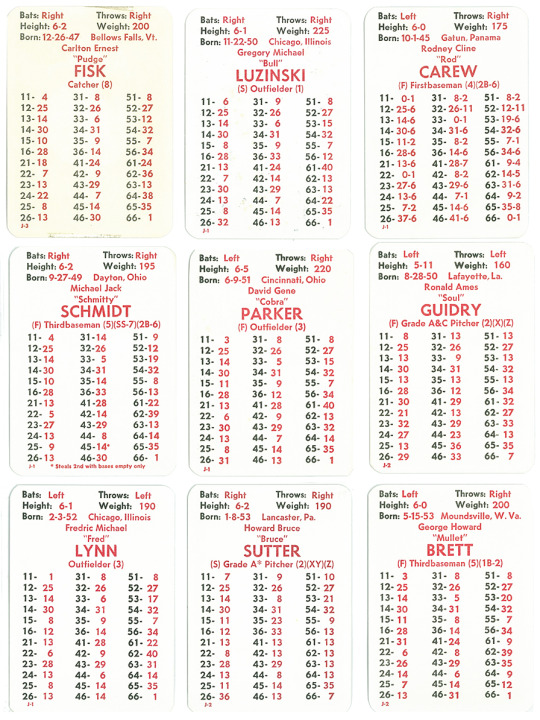
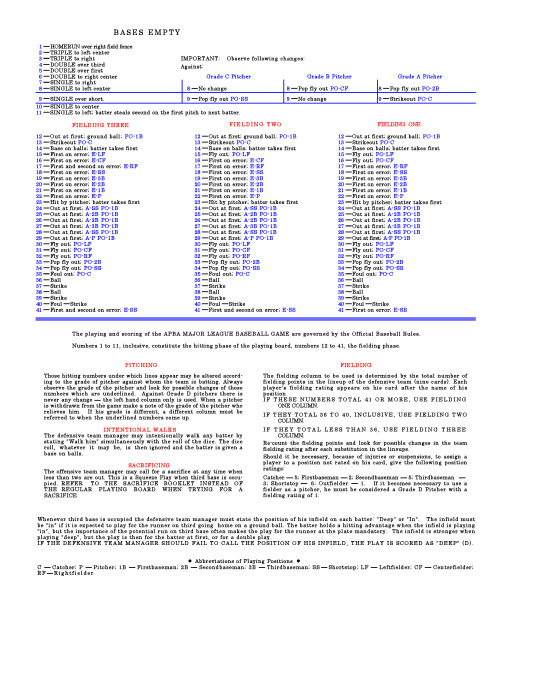

For example, with Carlton Fisk at bat, a d66 roll of 31 would yield a result of "8". Assuming for the sake of argument that the situation on the field is a runner on first and a grade C pitcher, consulting the "Runner on First Base" board, this corresponds to an outcome of "SINGLE—line drive to left; runner to third".
(This example is, strictly speaking, incorrect, as Carlton Fisk didn't have his major league debut until 1969 and I'm using the wrong lookup tables for any year in which he played, but you get the idea!)
Interestingly, APBA Baseball is not the first game to use this setup. It's heavily derived from Clifford Van Beek's National Pastime, a game whose patent was registered in 1925, though it wasn't actually published until 1930. Even at a glance, the similarities are substantial:
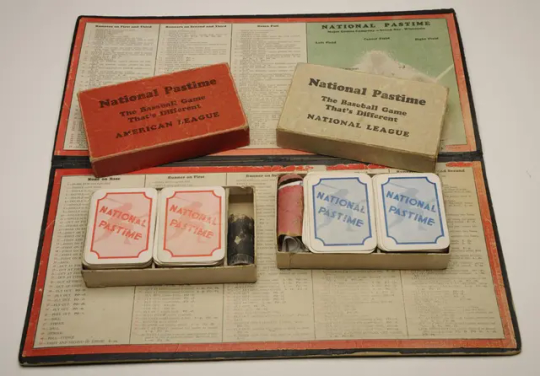
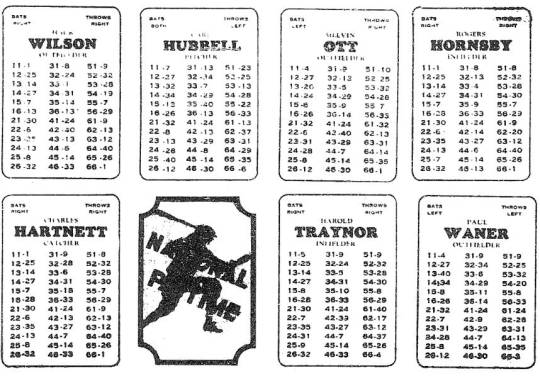
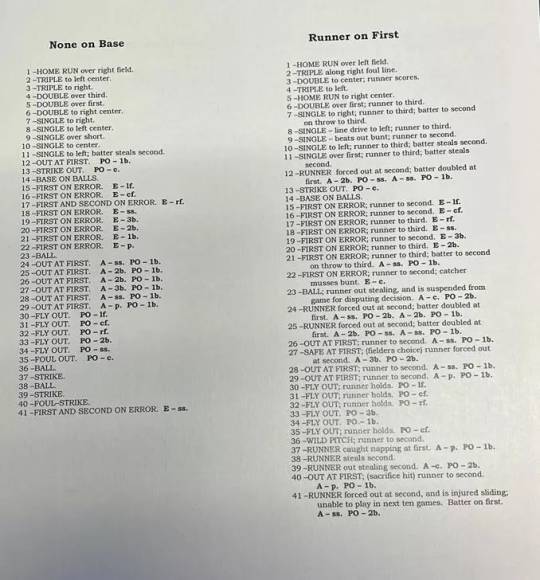
Indeed, though National Pastime's lookup tables are much simpler than APBA Baseball's, where they overlap they're often word for word identical. It's generally accepted that Seitz plagiarised National Pastime without credit when creating APBA Baseball (ironically, given his own famously combative stance toward alleged imitators!), though he was within his rights to do so, as National Pastime had fallen into the public domain by the time APBA Baseball was published.
We can go back even further, though. As far as I've been able to determine, the earliest known tabletop baseball simulator to use d66 lookup tables for resolving plays is Edward K McGill's Our National Ball Game, first published in 1886:
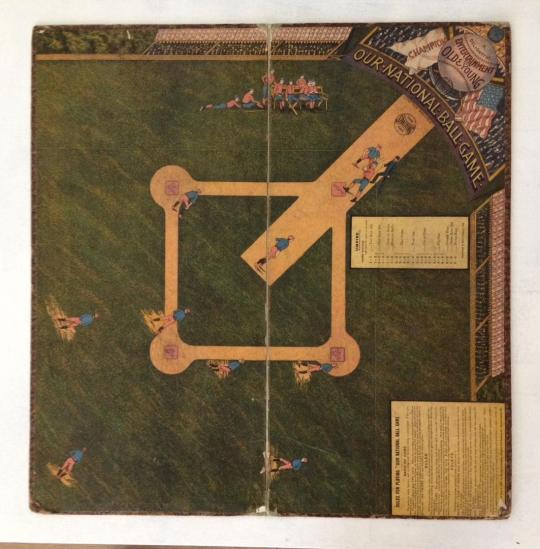

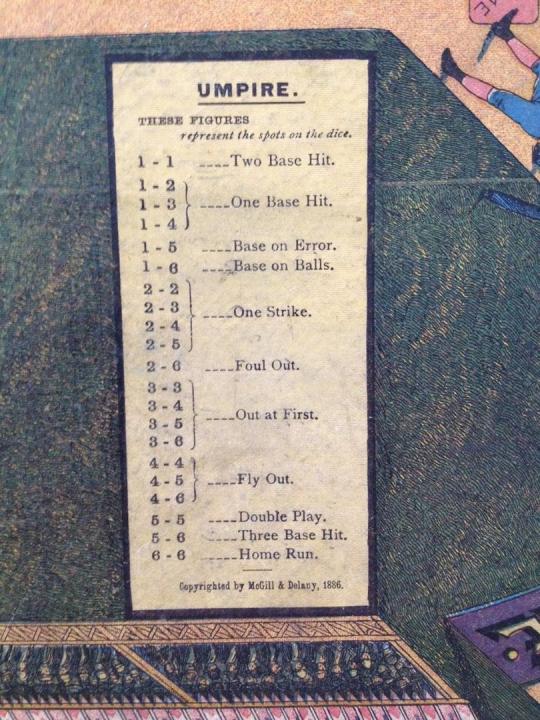
A copy of the game's 1887 US patent application can be downloaded here. This one uses an unusual 21-entry variant of the standard d66 lookup table in which the order of the rolled digits is insignificant, with doubles being half as likely as non-doubles rolls; it's unclear whether McGill was aware of this when he laid out the table. Unlike later incarnations of the genre, there are no individual player statistics, with all at-bats being resolved via the same table.
#gaming#tabletop games#board games#baseball#apba baseball#national pastime#our national ball game#game design#history
2K notes
·
View notes